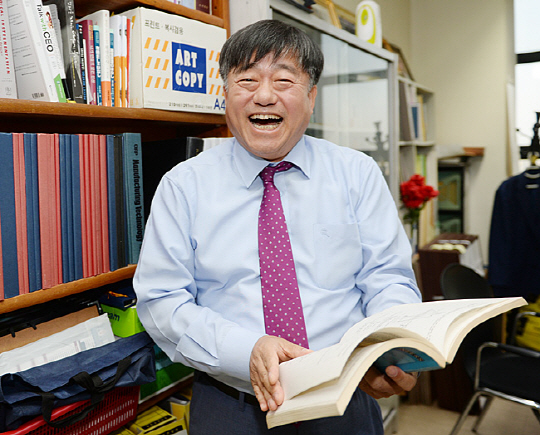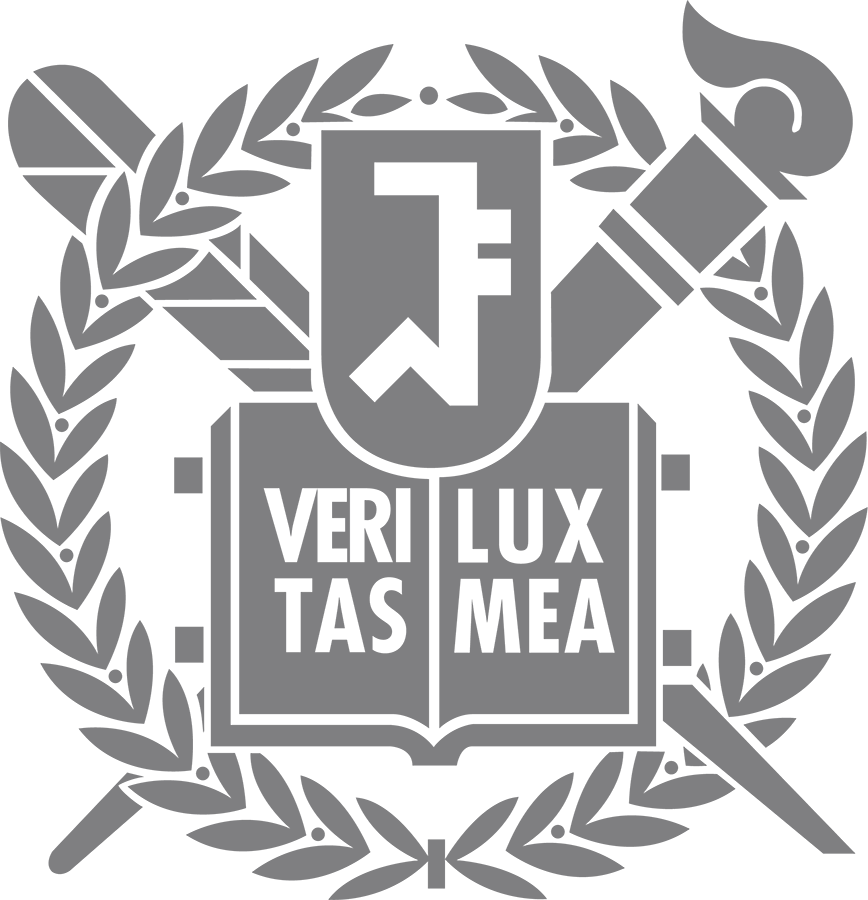Department News
Professor Heui Jae Pahk - [The Munhwa Il-bo] "Founded to be a boon in the country during the tribulation... First export price

▲ Heui Jae Pahk, a professor of Mechanical and Aerospace Engineering at Seoul National University smiles brightly holding his major textbooks. Kim Seon-Kyu reporter ufokim @
<?xml:namespace prefix = "o" ns = "urn:schemas-microsoft-com:office:office" />
Professor Heui Jae Pahk of Seoul National University- 'Venture No.1'
Heui Jae Pahk (56), a professor of mechanical and aerospace engineering at Seoul National University, explained the motivation for creating the company for the first time. Professor Pahk showed his first export price of $ 1, which was kept in a pie chart, to the media reporter. It was part of the $ 15,000 (about 17 million won) export of precision measurement sensors to a small Swedish company. Professor Park said that he would pull out the dollar one every time he had to close his mind to keep his intent. The company, which started with three younger generations, now has about 300 employees and its turnover reaches 100 billion won. Park, who has been an entrepreneur for 20 years, has been the head of the research and development (R & D) strategy planning department of the Ministry of Commerce, Industry and Energy. On the 17th, I met Professor Park at Seoul National University's Gwanak Engineering Center in Gwanak-gu, Seoul and talked about his experiences and economic issues.
Professor Pahk thought that he could easily start a business based on the papers and patents he wrote before he made the company, however the reality was different. He encountered various regulations for establishment of business. In order to meet the minimum capital requirement, Professor Pahk lent money on retirement allowance and tapped the peer professor 's lab door to find out the insufficient amount. Since universities could not have private interests, they had to register as delegates by borrowing the names of disciples and juniors in order to start a business. School laboratories did not get business registration, so they wasted time trying to find an office. Professor Park filed a petition with the presidential office, the prime minister's office, and the government ministries to remove the regulations. As a result of his efforts, he added that the Special Measures Law for the Promotion of Venture Businesses would be allowed to be a university professor and that a company could be established in the school. Professor Pahk said, "Although the regulations have been largely eliminated compared to the past, there are still many regulations that entangle entrepreneurs. If it is not harmful to national security, we should create an environment where all regulations are freed up and free enterprise is established ".
He stressed that what is needed for the start-up in Korea is to create an entrepreneurial ecosystem. Professor Pahk said, "In order to start a business, we need three factors: technology, marketing, and money." Above all, he explained, "It is necessary to organize an on-line and off-line space that connects experts in each field, that is, an ecosystem." Since this ecosystem is difficult to achieve on its own, it is claimed that the government needs to support the ecosystem until it is established.
Professor Pahk exemplified the southern city of Shenzhen, which is called the Silicon Valley of China. It has a wealth of technical manpower and factories as well as financial institutions, investment institutions and startup incubators. In such an environment, it is not difficult to invest in an idea and to seek expertise in the required field. Professor Pahk said, "In the first stage of propaganda, there was intervention such as the intention of the government to build a university campus, but now it is playing a role as a center for leading many founders in China." In Shenzhen, Young people can play in the field and learn how the global business is going. "
Professor Pahk emphasized innovation with top priority. Everyone knows better than ever that there is no time to relax because new technologies and products appear every day in the global market. Professor Park founded the company and developed precise measurement sensors. Since then, he has been in the business of measuring liquid crystal display (LCD) equipment. He has once again become the world leader in organic electroluminescent diode (OLED) organic deposition equipment did. At that time, the LCD measuring equipment market was in a stable phase rather than growing, but OLED business was still considered to be growth potential. Professor Pahk emphasized, "Companies must act like living creatures." Yesterday's success can lead to today's failure, and it is the qualities of a successful entrepreneur who constantly finds growth engines and challenges new fields. "
Professor Pahk said that while Jiangsu enterprises in foreign countries have secured almost half of the science and engineering sciences, they have made technological advances every day. In Korea, 84% of science and engineering graduates are concentrated in universities and research institutes. Only 16% are employed in enterprises, only 5% of them are SMEs. "If the vast majority of talented people in Korea continue to focus on papers at universities, corporate competitiveness is inevitable," he said.
Professor Pahk pointed out that "university-industry cooperation" is the starting point of university change. It is because they can understand the reality while listening to the voices of the companies competing to survive in the market, and the university can raise the talents that are capable of it. Industry-academia cooperation can bring about the effect of a one-stone-two bird, which allows companies to secure the manpower needed for innovation and at the same time provide young people with employment opportunities. In the case of SMEs, there is no room for one or two years of education by selecting a new employee, so we need ready talent. Professor Pahk said, "The university should do it." It is necessary to help the students prepare the right skills and know what the job is necessary right now. This is positive because it can raise the employment rate from the viewpoint of universities. Professor Pahk emphasized that the university with high employment rate, especially Germany, has very good academic-industrial cooperation, which means that college study and work are connected very naturally. Professor Pahk said, "Even if I study hard for four years in Korea, there are many cases where I do not have enough knowledge to get a job," said Pahk. "If companies and universities link up and do not increase their job competencies, I can not solve the reality that I am going to pay again. "
Professor Pahk is shaping the model of industry-academia cooperation. One of them is the 'Youth Work Platform Project for Industry-Academia Cooperation' in which three local techno parks and one university such as Sun Moon University participate. Thirty students who actively engaged in industry-academia cooperation successfully trained and trained students with business people, and succeeded in employing 120 people for six months from February to August. "I was convinced that industry-academia cooperation would be the answer to the job problem, and I wanted to do experiments that could prove my idea," he said. "I think it shows how important industry-academia cooperation can play in cultivating innovative talents. "
Professor Pahk pointed out that SMEs should develop skills and develop their capabilities in the global market. He expressed regret that 83% of the SMEs are mine companies that have not even exported a dollar. Professor Pahk said, "Korea is not only small, but it is also supersaturated, so it is meaningless to fight against a limited market." We should be able to raise the proportion of companies exporting technology to 17% to 70% "He said. It is the argument that SMEs need to put their goals on the global market, and that they can make a vision and make manpower easier and make them a driving force to increase corporate value. It will create a virtuous circle of competent talent and technology development, global market entry, and corporate growth.
Professor Pahk pointed out that SMEs should develop skills and develop their capabilities in the global market. He expressed regret that 83% of the SMEs are mine companies that have not even exported a dollar. Professor Pahk said, "Korea is not only small, but it is also supersaturated, so it is meaningless to fight against a limited market." We should be able to raise the proportion of companies exporting technology to 17% to 70% "He said. It is the argument that SMEs need to put their goals on the global market, and that they can make a vision and make manpower easier and make them a driving force to increase corporate value. It will create a virtuous circle of competent talent and technology development, global market entry, and corporate growth.
Professor Pahk said, "R & D support projects in Korea should be developed not as research papers for research, but as products with valuable value." "Korea's public and private sector R & D investment is about 66 trillion won last year, 4% of GDP," he said. "However, commercialization success rate and technology competitiveness are the lowest in the world. R & It does not lead to the end. " It is true that it is necessary to obtain original technology through basic research at the national level, but it is pointed out that it neglects practicality of technology in reality. Professor Pahk said, "Innovation capacity should lead to a virtuous cycle of job creation and economic growth. It is difficult to expect a positive effect as it only evaluates the number of papers published in quantitative terms." "Corporate competitiveness and industrial competitiveness are falling and job problems are getting worse. It is time to further worry about the practical use of technology. "
Pahk, who was the head of the R&D industry, commented positively about the new job creation committee of the government, Moon Jae In, and the venture department of the SME venture, saying, "90% of jobs are derived from SMEs. At the same time, however, he emphasized the so-called "grassroots industrial revolution" in which he heard the voice of the field. If there is lack of understanding about the field and various methods of support are provided, it will be a policy that is far from reality. The support that is not needed in the field is a waste of taxes and can not be achieved. Professor Pahk said, "I can not understand the site properly by excluding the voice of a company or simply listening to it for a few hours when creating a policy. We gather opinions from companies and look for problems and alternatives. It is more important than anything else."
Myeong Jin Yun, reporter jinieyoon@munhwa.com
Article http://www.munhwa.com/news/view.html?no=2017102501033509317001

